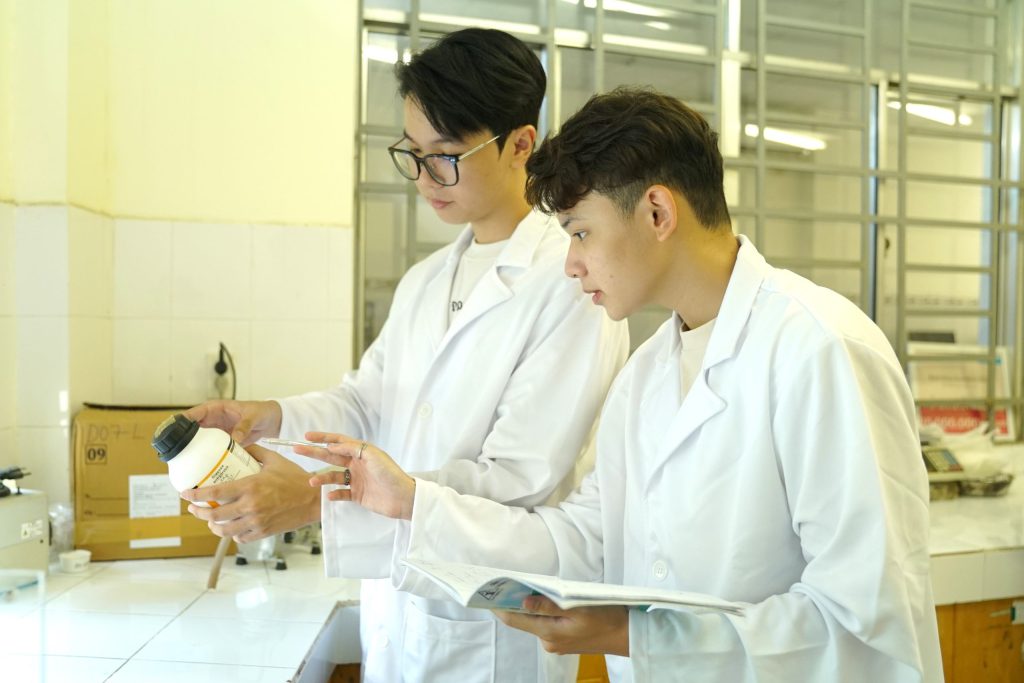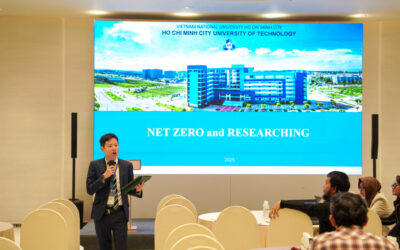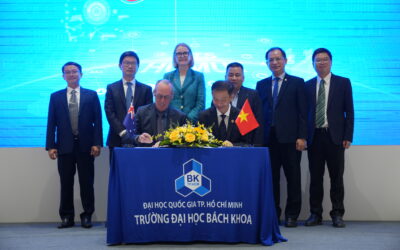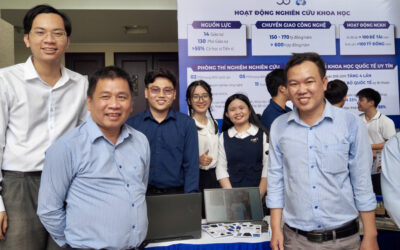Materials – the backbone of engineering – plays a crucial role in how our world functions. Interdisciplinary and fundamental yet exciting and challenging, materials engineering offers a captivating journey into the realm of matter. Lets explore this fascinating field through the eyes of industry experts.
A FUNDAMENTAL AND INTERDISCIPLINARY FIELD OF STUDY
Materials Engineering encompasses the application of mathematical, physical, chemical, and biological principles, along with a deep understanding of the properties, structures, and compositions of organic compounds, to tailor, process, design, and fabricate advanced and useful materials.
“Materials science and engineering programs at universities worldwide aim to guide students in unraveling the intricate relationship between the state, microstructure, processing technology, and material characteristics or properties,” explains Dr. Nguyen Khanh Son, Head of the Faculty of Materials Technology at Ho Chi Minh City University of Technology, Vietnam National University-Ho Chi Minh City (HCMUT, VNU-HCM). “Through this exploration, students gain a comprehensive understanding of material properties (strength, ductility, heat resistance, etc.), degradation and failure mechanisms, and the optimization of material performance throughout its lifecycle, from raw material extraction to product recycling.”, he continued.
Materials engineering is an inherently interdisciplinary field. Take, for instance, biomaterials – implant solutions that enable millions of patients to recover from injuries and minimise unnecessary surgeries – are created using materials that are safe for the human body. Achieving such breakthroughs requires scientists and engineers with a multidisciplinary understanding, combining knowledge of chemistry and physics (design/ manufacturing techniques) with biology (application characteristics).
Materials are ubiquitous in today’s world. Their applications span across various aspects of life, from electronics and telecommunications to transportation, aerospace, healthcare, energy, and the environment. It is evident that the progress of human civilization has been propelled by advancements in materials science and engineering.
The English-taught Materials Engineering program at HCMUT equips students with a solid foundation in the production, processing, testing, and comprehensive evaluation of the mechanical, physical, chemical, and electrical properties of various material groups, including metals, ceramics, glass, cement, rubber, and plastics, with a particular focus on energy materials and other advanced materials (electronic semiconductors, self-healing / self-repairing / self-sensing smart materials, biomedical materials, nanomaterials, etc.).

The program has received AUN/QA international accreditation and is taught entirely in English by a team of outstanding faculty members who hold degrees from prestigious universities worldwide, including the United States, France, Belgium, Japan, and South Korea. Notably, some of the faculty members are renowned leaders and scientists in their respective fields, such as:
• Assoc. Prof. Dr. Le Van Thang – President of the International University, former Vice President of Ho Chi Minh City University of Technology, expert in nanocarbon materials and metal corrosion protection
• Prof. Do Quang Minh – Scientist in the field of ceramics and glass production and environmental materials
• Assoc. Prof. Dr. Nguyen Thi Le Thu – Female scientist awarded the L’Oreal-UNESCO 2019 International Award and the Ta Quang Buu National Award 2022, expert in shape-memory polymers and self-healing polymers
A WORLD OF POSSIBILITIES FOR APPLICATION
Graduates of the Materials Engineering program are well-positioned for a wide range of career opportunities in diverse industries, including: research and development in materials science and engineering, production and manufacturing of materials and material-based products, quality control and testing, sales and marketing of materials and material-based products, consulting and technical support, etc. in a wide range of private enterprise, state-managed company, or multinational companies in:
- Microelectronics and semiconductors: Intel, Samsung, Nidec, Kyocera
- Energy and fuel cells: VinES, First Solar, LeLong, Solar BK, Pinaco Miền Nam
- Packaging and household products: Rạng Đông, Duy Tân, Tetra Park, Unilever, P&G
- Mechanical and automotive materials: Thaco Trường Hải, Thiên Sơn, Casumina, Michelin, Bridgestone, Robert Bosch
- Construction and infrastructure materials: Saint-Gobain, Fico YTL, UNIS, Xi măng Hà Tiên, Viglacera, Mapei Vietnam, Silkroad, Nippon Sheet Glass, Hyosung, Cadivi, Posco, Thép Pomina, Tôn Hoa sen, Tôn Đông Á
“As a former Materials Engineering student at HCMUT, I am always willing to support the department and the university in their training, internship, and recruitment efforts,” Mr. Dang Viet Hai, CEO of Constantia Flexibles Vietnam, a K2004 graduate of the program, shares his industry support:. “I am also happy to share my own experience in the materials manufacturing industry, where I have worked for over 15 years.”
Experience accumulated, graduates of the Materials Engineering program can advance to leadership positions, such as team leader, department head, supervisor, technical director/advisor, general manager, or even government officials responsible for managing the materials industry.
In addition, the Department of Materials Technology at HCMUT also has a strong track record of partnerships with many prestigious academic institutions around the world, including: JICA-AUN/SEED-Net, ECP (Ecole Centrale de Paris), INP Grenoble, CEA Grenoble, INSA Lyon (France), Monash University (Australia), Nagaoka University of Technology, Kyushu University, Toyohashi University of Technology (Japan), Sungkyunkwan University, Yeungnam University (South Korea), Ming Chi University of Technology (Taiwan)
Therefore, along with diverse opportunities for international exchange and internship, students with teaching and research orientation are also supported to access fully-funded scholarships from universities and credible partnerships.
A CHALLENGING YET REWARDING CAREER
Materials engineers are highly sought-after professionals across various sectors, including:
- Research, design, manufacture, evaluate, improve, and develop the properties of various materials.
- Provide technical consultation on various materials.
- Plan, organize, and operate technological processes/engineering systems.
- Monitor and manage the work of technicians and production staff.
- Supervise and maintain production/manufacturing lines for materials.
- Act as a liaison between suppliers, customers, and production/development staff.

As Nguyen Phu Hao, a K2017 graduate of the Materials Engineering program and a Research & Development Engineer at Kingfa Science & Technology Vietnam, explains:
“The strength of materials engineers is to develop product formulas and production processes that are suitable for each type of product. Each request from the company/ customer is a puzzle with many solutions.
Materials engineers need to propose the optimal solution to ensure that all product performance and production cost criteria are met. This is both interesting and challenging. It is interesting because materials engineers can flexibly change the solution to each puzzle based on the company’s available resources. The challenge is to figure out how to choose the best solution.
For example, at my company’s headquarters in Guangzhou (China), product development engineers can access a wide variety of raw plastic materials from multiple suppliers and always have the formulas for each type of product required. However, when building a new factory in Vietnam, the number of types of raw plastics needed to be streamlined while ensuring production needs in our country. At this point, the materials engineer needs to answer two questions at the same time:
• Which types of raw plastic should we buy?
• With only the selected plastics, how should the formula be changed to meet the requirements?
In addition to presenting suitable solutions, engineers also need to demonstrate their effectiveness through rigorous testing. For example, for products with specific mechanical, thermal, electrical, optical, and chemical property requirements, we need to introduce specific analysis methods for each of these properties – which are proud to be meticulously trained by the Materials Engineering program.
| After 20 years of establishment and development, in response to the real-time demands, the Faculty of Materials Technology at Ho Chi Minh City University of Technology, Vietnam National University-Ho Chi Minh City (HCMUT, VNU-HCM) has launched an English-taught Program in Advanced Materials Engineering. This formal training program, whose Bachelor degree is presented by HCMUT and accredited by AUN/QA, is fully delivered in English and at District 10 campus, in the heart of vibrant Ho Chi Minh City. The program is suitable for students passionate about exploring the unseen beauty of the material world under a microscope, and aspiring to invent advanced materials with superior properties and environmental friendliness. |



